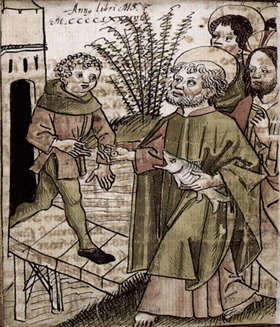Becoming God
"I tell you, in this place is one greater than the Temple." – Matthew 12.6
The essence of Matthew's makeover of Mark was to emphasise the godlike qualities of Jesus and minimize any restrictions upon his divine power. To this end, the miracles of Jesus in the Gospel of Matthew were made more immediate, powerful and effortless. In Matthew's redacted text, Jesus became more omniscient, unequivocal and judgemental and he was recognized and proclaimed by others as "Lord" repeatedly.
In this process, Jesus lost much of his humanity and the distinction between himself and God the Father became blurred.
Miracles more immediate, powerful, effortless
When Mark's Jesus began his Galilean ministry, he "cured many" and "his fame began to spread throughout the surrounding region of Galilee" (1.28-34). However, when Matthew's Jesus began his Galilean ministry, he "cured every disease and every sickness among the people" and "his fame spread throughout all Syria" (Matthew 4.23).
This was the essence of Matthew's upgrade: his Jesus had no limitations.
The miracles of Jesus that appear in Matthew's gospel are actually shorter, not longer, than those in Mark's original text (for example, the Gadarene swine story drops from four hundred and thirteen words to one hundred and sixty three; the withering fig tree episode drops from two hundred words to one hundred and thirty). The miracle stories in Matthew are not memories, embellished with additional detail from an "independent witness". They are not even novel fantasies from an imaginative story-teller. The miracles are nothing but the original fictions lifted from Mark and modified by a redactor with a clear theological agenda.
Much of the colourful detail found in Mark's script was theatrical – a paralytic man lowered through the roof of a house, for example, a blind beggar "throwing off his mantle", or crowds rushing back and forth as a group. Such "drama" probably worked well in the original Jesus "mystery" play but for Matthew's more sober "scripture", this colour was stripped away. Unnecessary palaver in the miracle itself and distracting extraneous detail was not allowed to obscure the majestic power possessed by Matthew's enhanced Jesus.
Because Matthew's Jesus "knows all things", the only questions he asks are purely rhetorical and other questions asked by Mark's Jesus disappear. In his treatment of the miracle material, Matthew stresses the omnipotence of Jesus, and he discards incidental detail about other people that Mark had included. By simply omitting, changing or adding a few words, each miracle was made more miraculous. Running through them all was a clear evangelical message that those who recognise Jesus as Lord, Son of God and Son of David will experience miracles as a reward of their faith.
The miracles, when examined in detail, make it very clear that the author of Matthew was no chronicler of historical events. Matthew took the "man possessed by the spirit" that he found in Mark's gospel and refashioned him as a demigod, all-knowing, above human emotions, a man of uncompromising power over spirits, disease, the forces of nature and death itself.
| Mark's original story |
|
Matthew's redacted version |
Healing Many
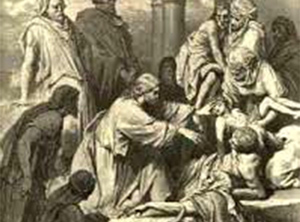
He healed many who were sick with various diseases, and cast out many demons; and he would not permit the demons to speak, because they knew him.
Mark 1.34
|
|
Healing ALL
"Many" was not good enough for Matthew's Jesus, who "healed all who were sick" and now the miracles had the added bonus that they "fulfilled a prophecy" from Isaiah.
Actually, the idea that this healing fulfilled "prophecy" is a bit of a stretch. Isaiah 53.4 (in Hebrew) reads, "Surely he has borne our griefs
and carried our sorrows." Yet Jesus is able to heal effortlessly with a word or a gesture – that hardly qualifies as "bearing grief or carrying sorrow."
Matthew also drops the order from Mark's Jesus to the demons to stay silent. The so-called "messianic secret", where Mark's Jesus demands secrecy about his actions or identity, added tension to Mark's play but was for the most part redundant to Matthew's scripture.
He cast out the spirits with a word, and healed all who were sick. This was to fulfil what was spoken by the prophet Isaiah, "He took our infirmities and bore our diseases."
Matthew 8.16-17
|
Healing Simon's Mother-in-law
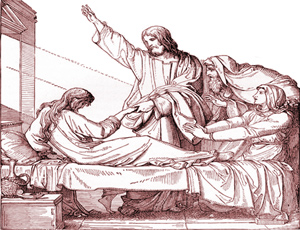
Now Simon's mother-in-law lay sick with a fever, and immediately they told him of her. And he came and took her by the hand and lifted her up, and the fever left her; and she served them.
Mark 1.30-31
|
|
Jesus does not need to be "told" the woman is sick, nor does he need to lift her up. Just a touch is all it takes – and she serves "him" not "them".
And when Jesus entered Peter's house, he saw his mother-in-law lying sick with a fever; he touched her hand, and the fever left her, and she rose and served him.
Matthew 8.14-15
|
Healing a Leper
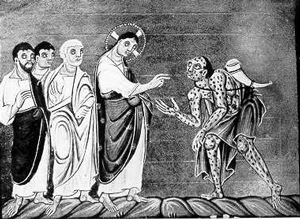
"And a leper came to him beseeching him, and kneeling said to him, "If you will, you can make me clean." Moved with anger, he stretched out his hand and touched him, and said to him, "I will; be clean." And immediately the leprosy left him, and he was made clean.
And he sternly charged him, and sent him away at once,
and said to him, "See that you say nothing to any one; but go, show yourself to the priest, and offer for your cleansing what Moses commanded, for a proof to the people."
But he went out and began to talk freely about it, and to spread the news, so that Jesus could no longer openly enter a town, but was out in the country; and people came to him from every quarter.
Mark 1.40-45
|
|
The leper in Matthew addresses Jesus as Lord; the references to Jesus' emotions (anger/severity) are dropped, as is the restriction that he could no longer "go where he chose."
"And behold, a leper came to him and knelt before him, saying, "Lord, if you will, you can make me clean." And he stretched out his hand and touched him, saying, "I will; be clean." And immediately his leprosy was cleansed.
And Jesus said to him, "See that you say nothing to any one; but go, show yourself to the priest, and offer the gift that Moses commanded, for a proof to the people."
Matthew 8:2-4
|
Healing Palsy
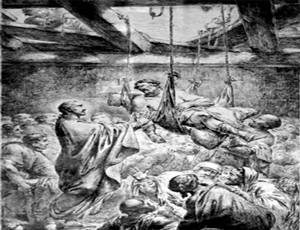
And when he returned to Capernaum after some days, it was reported that he was at home. And many were gathered together, so that there was no longer room for them, not even about the door; and he was preaching the word to them.
And they came, bringing to him a paralytic carried by four men.
And when they could not get near him because of the crowd, they removed the roof above him; and when they had made an opening, they let down the pallet on which the paralytic lay.
And when Jesus saw their faith, he said to the paralytic, "My son, your sins are forgiven." Now some of the scribes were sitting there, questioning in their hearts, "Why does this man speak thus? It is blasphemy! Who can forgive sins but God alone?"
And immediately Jesus, perceiving in his spirit that they thus questioned within themselves, said to them, "Why do you question thus in your hearts? Which is easier, to say to the paralytic, 'Your sins are forgiven,' or to say, 'Rise, take up your pallet and walk'? But that you may know that the Son of man has authority on earth to forgive sins".
He said to the paralytic, "I say to you, rise, take up your pallet and go home." And he rose, and immediately took up the pallet and went out before them all; so that they were all amazed and glorified God, saying, "We never saw anything like this!"
Mark 2.1-12
|
|
Matthew drops the reference to Jesus being "at home in Capernaum" (which conflicts with his idea for a home town for Jesus in Nazareth). Jesus is in "his own city" but it happens to be Capernaum!
Matthew also drops the crush of the crowd and
the bizarre and highly theatrical scene of "roof removal" with four men letting down a bed from above. They couldn't get through the door but could get up to the roof?
The first response of Jesus was not to heal the man but to forgive his sins, provoking the scribes. But if, as Mark says, Jesus was at home, why were there hostile scribes present?
Matthew moves the miracle into the city and omits the reasonable argument from the scribes that "forgiving sin" was a prerogative of God alone. He retains their charge of blasphemy but where Mark's scribes merely questioned the claim of Jesus, Matthew's scribes "think evil." The battle lines are being drawn.
Matthew is melding his Jesus with God so he has chosen this occasion to have Jesus stake his claim to divinity by forgiving sins. The instant healing of the paralytic that follows is intended merely to illustrate his divine power.
And getting into a boat he crossed over and came to his own city. And behold, they brought to him a paralytic, lying on his bed; and when Jesus saw their faith he said to the paralytic, "Take heart, my son; your sins are forgiven."
And behold, some of the scribes said to themselves, "This man is blaspheming." But Jesus, knowing their thoughts, said, "Why do you think evil in your hearts? For which is easier, to say, 'Your sins are forgiven,' or to say, 'Rise and walk'? But that you may know that the Son of man has authority on earth to forgive sins" – he then said to the paralytic, "Rise, take up your bed and go home." And he rose and went home. When the crowds saw it, they were afraid, and they glorified God, who had given such authority to men.
Matthew 9.2-8
|
The Withered Hand
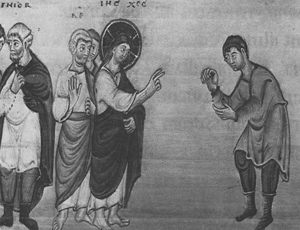
Again he entered the synagogue, and a man was there who had a withered hand. And they watched him, to see whether he would heal him on the sabbath, so that they might accuse him.
And he said to the man who had the withered hand, "Come here." And he said to them, "Is it lawful on the sabbath to do good or to do harm, to save life or to kill?" But they were silent.
And he looked around at them with anger, grieved at their hardness of heart, and said to the man, "Stretch out your hand." He stretched it out, and his hand was restored.
The Pharisees went out, and immediately held counsel with the Herodians against him, how to destroy him.
Mark 3.1-6
|
|
Rather than have Jesus ask a question, Matthew has his Jesus answer a question as to what is lawful on a sabbath. He answers with an allegory about rescuing sheep.
His emotions (anger, grief) are eliminated; Jesus gives a sage-like ruling on what is lawful; and the wholeness of the hand is emphasized.
The highly unlikely alliance of "Pharisees and Herodians" was also dropped.
And he went on from there, and entered their synagogue. And behold, there was a man with a withered hand. And they asked him, "Is it lawful to heal on the sabbath?" so that they might accuse him.
He said to them, "What man of you, if he has one sheep and it falls into a pit on the sabbath, will not lay hold of it and lift it out? Of how much more value is a man than a sheep! So it is lawful to do good on the sabbath."
Then he said to the man, "Stretch out your hand." And the man stretched it out, and it was restored, whole like the other.
But the Pharisees went out and took counsel against him, how to destroy him.
Matthew 12.9-14
|
Stilling the Storm
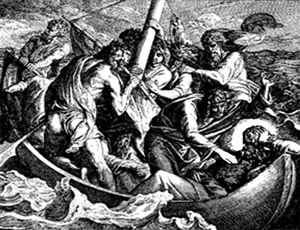
And leaving the crowd, they took him with them in the boat, just as he was.
And other boats were with him.
And a great storm of wind arose, and the waves beat into the boat, so that the boat was already filling.
But he was in the stern, asleep on the cushion; and they woke him and said to him,
"Teacher, do you not care if we perish?"
And he awoke and rebuked the wind, and said to the sea, "Peace! Be still!" And the wind ceased, and there was a great calm.
He said to them, "Why are you afraid? Have you no faith?"
And they were filled with awe, and said to one another, "Who then is this, that even wind and sea obey him?"
Mark 4. 36-41
|
|
Matthew's Jesus leads his disciples into the boat (they don't "take him with them, just as he was"!).
The enigmatic "other boats" are eliminated (perhaps they sank!)
There's no mention of a cushion, Jesus does not awake twice, and he is addressed as "Lord". More logically, Matthew's Jesus asks the disciples why they are afraid before rather than after he stills the storm.
And when he got into the boat, his disciples followed him.
And behold, there arose a great storm on the sea, so that the boat was being swamped by the waves;
but he was asleep. And they went and woke him, saying, "Save, Lord; we are perishing."
And he said to them, "Why are you afraid, O men of little faith?"
Then he rose and rebuked the winds and the sea; and there was a great calm.
And the men marveled, saying, "What sort of man is this, that even winds and sea obey him?"
Matthew 8.23-27
|
The Gadarene Demoniac
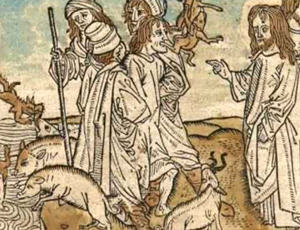
They came to the other side of the sea, to the country of the Gerasenes.
And when he had come out of the boat, there met him out of the tombs a man with an unclean spirit, who lived among the tombs; and no one could bind him any more, even with a chain; for he had often been bound with fetters and chains, but the chains he wrenched apart, and the fetters he broke in pieces; and no one had the strength to subdue him.
Night and day among the tombs and on the mountains he was always crying out, and bruising himself with stones. And when he saw Jesus from afar, he ran and worshiped him; and crying out with a loud voice, he said, "What have you to do with me, Jesus, Son of the Most High God?
I adjure you by God,
do not torment me."For he had said to him, "Come out of the man, you unclean spirit!"
And Jesus asked him, "What is your name?" He replied, "My name is Legion; for we are many."
And he begged him eagerly not to send them out of the country.
Now a great herd of swine was feeding there on the hillside; and they begged him, "Send us to the swine, let us enter them." So he gave them leave. And the unclean spirits came out, and entered the swine; and the herd, numbering about two thousand, rushed down the steep bank into the sea, and were drowned in the sea.
The herdsmen fled, and told it in the city and in the country.
And people came to see what it was that had happened. And they came to Jesus, and saw the demoniac sitting there, clothed and in his right mind, the man who had had the legion; and they were afraid.
And those who had seen it told what had happened to the demoniac and to the swine.
And they began to beg Jesus to depart from their neighborhood.
And as he was getting into the boat, the man who had been possessed with demons begged him that he might be with him.
But he refused, and said to him, "Go home to your friends, and tell them how much the Lord has done for you, and how he has had mercy on you." And he went away and began to proclaim in the Decapolis how much Jesus had done for him; and all men marveled.
Mark 5.1-20
|
|
The "country of the Gerasene" is replaced with the tad more realistic "country of the Gadarenes" and Matthew abbreviates Mark's wordy tale: no asking for a name, no redundant repetition, no reference to two thousand, no appeal to God by the demons.
But Matthew doubles the miracle – two demoniacs. The swine are not "there on the hillside" but "at some distance". The bizarre idea of demons worshipping Jesus is removed but they show their respect: they know that it is "before the time" and acknowledge Jesus' power ("If you cast us out").
Matthew realises that telling "in the city and in the country" is plain unrealistic so he writes just "in the city". Respectfully, the people come out "to meet Jesus", not to "see what happened". This time, they are not "afraid" of Jesus – but still beg him to leave!.
And when he came to the other side, to the country of the Gadarenes,
two demoniacs met him, coming out of the tombs, so fierce that no one could pass that way.
And behold, they cried out, "What have you to do with us, O Son of God?
Have you come here to torment us before the time?"
Now a herd of many swine was feeding at some distance from them. And the demons begged him, "If you cast us out, send us away into the herd of swine."
And he said to them, "Go." So they came out and went into the swine;
and behold, the whole herd rushed down the steep bank into the sea, and perished in the waters.
The herdsmen fled, and going into the city they told everything, and what had happened to the demoniacs.
And behold, all the city came out to meet Jesus; and when they saw him, they begged him to leave their neighborhood.
Matthew 8.28-34
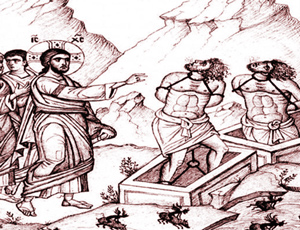
|
The Daughter of Jairus
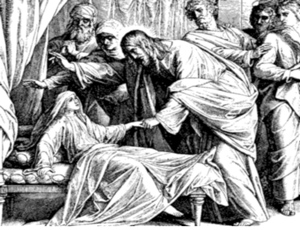
Then came one of the rulers of the synagogue, Jairus by name; and seeing him, he fell at his feet, and besought him, saying, "My little daughter is at the point of death. Come and lay your hands on her, so that she may be made well, and live." And he went with him ...
While he was still speaking, there came from the ruler's house some who said, "Your daughter is dead. Why trouble the Teacher any further?" But ignoring what they said, Jesus said to the ruler of the synagogue, "Do not fear, only believe." And he allowed no one to follow him except Peter and James and John the brother of James. When they came to the house of the ruler of the synagogue, he saw a tumult, and people weeping and wailing loudly. And when he had entered, he said to them, "Why do you make a tumult and weep? The child is not dead but sleeping." And they laughed at him. But he put them all outside, and took the child's father and mother and those who were with him, and went in where the child was. Taking her by the hand he said to her, "Tal′itha cu′mi"; which means, "Little girl, I say to you, arise." And immediately the girl got up and walked (she was twelve years of age), and they were immediately overcome with amazement. And he strictly charged them that no one should know this, and told them to give her something to eat.
Mark 5.23,43
|
|
Whereas Jairus' daughter in Mark "was at the point of death", in Matthew's more emphatic version, she had "just died." The suggestion, therefore, that some thought the teacher could heal the sick but not raise the dead was removed.
In Matthew's succinct version of the tale, the ruler's name was omitted, as also the names of the accompanying disciples. No one is allowed to crowd in on the big man himself. The planted Aramaic phrase was removed, and of course, the suggestion that the girl required feeding after being restored to life was also dropped!
While he was thus speaking to them, behold, a ruler came in and knelt before him, saying, "My daughter has just died; but come and lay your hand on her, and she will live." And Jesus rose and followed him, with his disciples ...
And when Jesus came to the ruler's house, and saw the flute players, and the crowd making a tumult, he said, "Depart; for the girl is not dead but sleeping." And they laughed at him. But when the crowd had been put outside, he went in and took her by the hand, and the girl arose. And the report of this went through all that district.
Matthew 9,18-25
|
The Bleeding Afflicted Woman
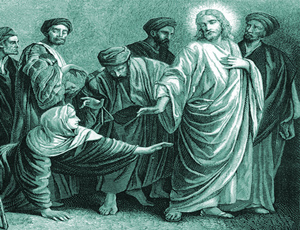
And a great crowd followed him and thronged about him. And there was a woman who had had a flow of blood for twelve years, and who had suffered much under many physicians, and had spent all that she had, and was no better but rather grew worse.
She had heard the reports about Jesus, and came up behind him in the crowd and touched his garment. For she said, "If I touch even his garments, I shall be made well." And immediately the hemorrhage ceased; and she felt in her body that she was healed of her disease. And Jesus, perceiving in himself that power had gone forth from him, immediately turned about in the crowd, and said, "Who touched my garments?" And his disciples said to him, "You see the crowd pressing around you, and yet you say, 'Who touched me?'" And he looked around to see who had done it. But the woman, knowing what had been done to her, came in fear and trembling and fell down before him, and told him the whole truth. And he said to her, "Daughter, your faith has made you well; go in peace, and be healed of your disease."
Mark 5:25-34
|
|
Even in this abbreviated miracle, the miraculous is heightened: the woman touches just the fringe of his garment. In Mark's version she had verbalized her intention but in Matthew's she speaks only to herself yet Jesus "knows."
Bizarrely, in Mark, "power went out of" Jesus when the women touched his cloak. Matthew was having no such nonsense and his Jesus tells the woman that only "her faith had cured her." In Matthew's version, there is no questioning by Jesus as to who touched him, and no need to be "told" the whole truth – Matthew's Jesus, of course, again knows the whole truth!
And behold, a woman who had suffered from a hemorrhage for twelve years came up behind him and touched the fringe of his garment; for she said to herself, "If I only touch his garment, I shall be made well." Jesus turned, and seeing her he said, "Take heart, daughter; your faith has made you well." And instantly the woman was made well.
Matthew 9:20-22
|
Feeding the Five Thousand
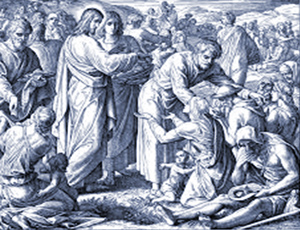
And they went away in the boat to a lonely place by themselves. Now many saw them going, and knew them, and they ran there on foot from all the towns, and got there ahead of them.
As he went ashore he saw a great throng, and he had compassion on them, because they were like sheep without a shepherd; and he began to teach them many things. And when it grew late, his disciples came to him and said, "This is a lonely place, and the hour is now late; send them away, to go into the country and villages round about and buy themselves something to eat."
But he answered them, "You give them something to eat." And they said to him, "Shall we go and buy two hundred denarii worth of bread, and give it to them to eat?" And he said to them, "How many loaves have you? Go and see." And when they had found out, they said, "Five, and two fish."
Then he commanded them all to sit down by companies upon the green grass. So they sat down in groups, by hundreds and by fifties.
And taking the five loaves and the two fish he looked up to heaven, and blessed, and broke the loaves, and gave them to the disciples to set before the people; and he divided the two fish among them all.
And they all ate and were satisfied. And they took up twelve baskets full of broken pieces and of the fish. And those who ate the loaves were five thousand men.
Mark 6:32-44
|
|
Matthew rationalises the ludicrous scenario in Mark that the crowd watched Jesus and the disciples leave and ran "from all the towns" to arrive "where they were going ahead of them". Instead, more respectfully, the crowd follow Jesus on foot.
Jesus heals rather that teaches; the silly suggestion from the disciples that they "go shopping" was dropped; Jesus does not need to ask how many loaves they have, and the odd "sitting the crowd in companies of hundreds and fifties" was dropped.
Finally, Matthew adds women and children to the number fed.
Now when Jesus heard this, he withdrew from there in a boat to a lonely place apart. But when the crowds heard it, they followed him on foot from the towns. As he went ashore he saw a great throng; and he had compassion on them, and healed their sick.
When it was evening, the disciples came to him and said, "This is a lonely place, and the day is now over; send the crowds away to go into the villages and buy food for themselves." Jesus said, "They need not go away; you give them something to eat." They said to him, "We have only five loaves here and two fish." And he said, "Bring them here to me."
Then he ordered the crowds to sit down on the grass; and taking the five loaves and the two fish he looked up to heaven, and blessed, and broke and gave the loaves to the disciples, and the disciples gave them to the crowds. And they all ate and were satisfied. And they took up twelve baskets full of the broken pieces left over. And those who ate were about five thousand men, besides women and children.
Matthew 14:13-21
|
Feeding the Four Thousand
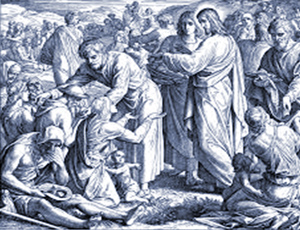
In those days, when again a great crowd had gathered, and they had nothing to eat, he called his disciples to him, and said to them, "I have compassion on the crowd, because they have been with me now three days, and have nothing to eat; and if I send them away hungry to their homes, they will faint on the way; and some of them have come a long way."
And his disciples answered him, "How can one feed these men with bread here in the desert?"
And he asked them, "How many loaves have you?" They said, "Seven."
And he commanded the crowd to sit down on the ground; and he took the seven loaves, and having given thanks he broke them and gave them to his disciples to set before the people; and they set them before the crowd.
And they had a few small fish; and having blessed them, he commanded that these also should be set before them. And they ate, and were satisfied; and they took up the broken pieces left over, seven baskets full. And there were about four thousand people. And he sent them away; and immediately he got into the boat with his disciples, and went to the district of Dalmanutha.
Mark 8.1-10
|
|
The "compassion" of Jesus in the two repeated feeding stories shifts from "shepherdless sheep" (Mark) and "sickness" (Matthew, version one) to hunger.
Again, Matthew clarifies that the number now includes additional women and children, and he corrects Dalmanutha to Magadan.
Then Jesus called his disciples to him and said, "I have compassion on the crowd, because they have been with me now three days, and have nothing to eat; and I am unwilling to send them away hungry, lest they faint on the way."
And the disciples said to him, "Where are we to get bread enough in the desert to feed so great a crowd?" And Jesus said to them, "How many loaves have you?" They said, "Seven, and a few small fish."
And commanding the crowd to sit down on the ground, he took the seven loaves and the fish, and having given thanks he broke them and gave them to the disciples, and the disciples gave them to the crowds. And they all ate and were satisfied; and they took up seven baskets full of the broken pieces left over.
Those who ate were four thousand men, besides women and children. And sending away the crowds, he got into the boat and went to the region of Magadan.
Matthew 15.32-38
|
Jesus Walking on the Water
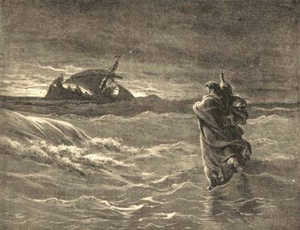
And when evening came, the boat was out on the sea, and he was alone on the land. And he saw that they were making headway painfully, for the wind was against them.
And about the fourth watch of the night he came to them, walking on the sea.
He meant to pass by them, but when they saw him walking on the sea they thought it was a ghost, and cried out; for they all saw him, and were terrified.
But immediately he spoke to them and said, "Take heart, it is I; have no fear."
And he got into the boat with them and the wind ceased. And they were utterly astounded, for they did not understand about the loaves, but their hearts were hardened.
Mark 6:47-56 |
|
Matthew rationalises this scene, placing the boat "many furlongs" out at sea and avoids saying that Jesus actually "saw" the boat – it was the "fourth watch of the night" after all!
The odd reference by Mark to Jesus "passing by them" was omitted and the miracle itself was doubled up by having Peter also walk on the water!
In keeping with Matthew's softer line towards the disciples, he replaced their "hardened hearts" with a reverential proclamation that Jesus was the "Son of God".
When evening came, he was there alone, but the boat by this time was many furlongs distant from the land, beaten by the waves; for the wind was against them.
And in the fourth watch of the night he came to them, walking on the sea. But when the disciples saw him walking on the sea, they were terrified, saying, "It is a ghost!" and they cried out for fear.
But immediately he spoke to them, saying, "Take heart, it is I; have no fear."
And Peter answered him, "Lord, if it is you, bid me come to you on the water." He said, "Come." So Peter got out of the boat and walked on the water and came to Jesus; but when he saw the wind, he was afraid, and beginning to sink he cried out, "Lord, save me." Jesus immediately reached out his hand and caught him, saying to him, "O man of little faith, why did you doubt?"
And when they got into the boat, the wind ceased. And those in the boat worshiped him, saying, "Truly you are the Son of God."
Matthew 14:23-33
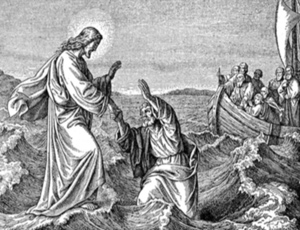
|
Syrophoenician Woman's Daughter
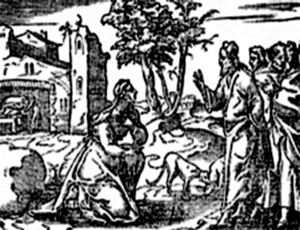
And from there he arose and went away to the region of Tyre and Sidon. And he entered a house, and would not have any one know it; yet he could not be hid.
But immediately a woman, whose little daughter was possessed by an unclean spirit, heard of him, and came and fell down at his feet. Now the woman was a Greek, a Syrophoenician by birth. And she begged him to cast the demon out of her daughter.
And he said to her, "Let the children first be fed, for it is not right to take the children's bread and throw it to the dogs."
But she answered him, "Yes, Lord; yet even the dogs under the table eat the children's crumbs."
And he said to her, "For this saying you may go your way; the demon has left your daughter."
And she went home, and found the child lying in bed, and the demon gone.
Mark 7.24-30
|
|
Mark's Jesus fails to remain hidden, a limitation on his power omitted by Matthew. The Canaanite woman recognizes Jesus as Son of David but Jesus ignores her first plea and the disciples beg him to send her away.
Jesus declares his mission statement: he is "sent only for the lost sheep of Israel."
The woman kneels and pleas again. In Mark, her memorable response ("even dogs under the table eat the children's crumbs") gained her a miracle. In Matthew it became the woman's faith that secured the miracle – and the cure was instant!
All very symbolic of allowing non-Jews, of sufficient faith, to worship the god of Israel.
And Jesus went away from there and withdrew to the district of Tyre and Sidon. And behold, a Canaanite woman from that region came out and cried,
"Have mercy on me, O Lord, Son of David; my daughter is severely possessed by a demon." But he did not answer her a word.
And his disciples came and begged him, saying, "Send her away, for she is crying after us."
He answered, "I was sent only to the lost sheep of the house of Israel." But she came and knelt before him, saying, "Lord, help me."
And he answered, "It is not fair to take the children's bread and throw it to the dogs."
She said, "Yes, Lord, yet even the dogs eat the crumbs that fall from their masters' table."
Then Jesus answered her, "O woman, great is your faith! Be it done for you as you desire." And her daughter was healed instantly.
Matthew 15.21-28
|
The Deaf and Dumb
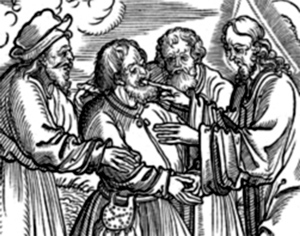
They brought to him a deaf man who had an impediment in his speech; and they begged him to lay his hand on him. He took him aside in private, away from the crowd, and put his fingers into his ears, and he spat and touched his tongue. Then looking up to heaven, he sighed and said to him, 'Ephphatha', that is, 'Be opened.' And immediately his ears were opened, his tongue was released, and he spoke plainly.
Mark 7.32-37.
|
|
Matthew really didn't like Mark's convoluted healing of a deaf mute – involving fingers in his ears, in his mouth, sighs, looks up to heaven, and even an Aramaic incantation! Matthew dropped this miracle entirely.
In its stead, Matthew placed an insipid healing of "many lame, maimed, blind and dumb", performed without any palaver but with glorification of the God of Israel. His source? Isaiah 35, although that writer was referring to the "redeemed" returning to Zion several centuries earlier!
And great crowds came to him, bringing with them the lame, the maimed, the blind, the dumb, and many others, and they put them at his feet, and he healed them, so that the throng wondered, when they saw the dumb speaking, the maimed whole, the lame walking, and the blind seeing; and they glorified the God of Israel.
Matthew 15.30-31
|
The Blind near Bethsaida
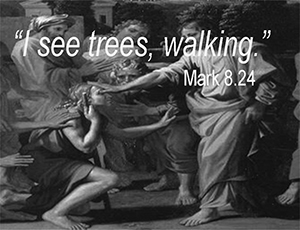
And they came to Bethsaida.
And some people brought to him a blind man, and begged him to touch him. And he took the blind man by the hand, and led him out of the village; and when he had spit on his eyes and laid his hands upon him, he asked him, "Do you see anything?" And he looked up and said, "I see men; but they look like trees, walking." Then again he laid his hands upon his eyes; and he looked intently and was restored, and saw everything clearly.
And he sent him away to his home, saying, "Do not even enter the village.
Mark 8:22-26
|
|
Matthew didn't approve of Jesus needing two attempts at the healing of a blind man near Bethsaida so that particular miracle finds no place in Matthew. Instead, Matthew substituted the instant healing of two blind men, a mile down the road at Capernaum!
They speak in unison, recognizing Jesus as both Lord and Son of David. The healing is immediate.
And as Jesus passed on from there, two blind men followed him, crying aloud, "Have mercy on us, Son of David." When he entered the house, the blind men came to him; and Jesus said to them, "Do you believe that I am able to do this?" They said to him, "Yes, Lord." Then he touched their eyes, saying, "According to your faith be it done to you." And their eyes were opened. And Jesus sternly charged them, "See that no one knows it." But they went away and spread his fame through all that district.
Matthew 9.27-31
As an afterthought, Matthew added a nondescript ultra-brief second miracle (of a dumb demoniac) to stress how unique was all this healing but that the Pharisees thought evil.
He liked this so much he reused his own text later in the story!
As they were going away, behold, a dumb demoniac was brought to him. And when the demon had been cast out, the dumb man spoke; and the crowds marveled, saying, "Never was anything like this seen in Israel. But the Pharisees said, 'It is by the prince of demons that he drives out demons.'" – Matthew 9.31-33
"Then they brought him a demon-possessed man who was blind and mute, and Jesus healed him, so that he could both talk and see. All the people were astonished and said, "Could this be the Son of David?" But when the Pharisees heard this, they said, "It is only by Beelzebub, the prince of demons, that this fellow drives out demons."– Matthew 12.22-24.
|
Boy with a demon
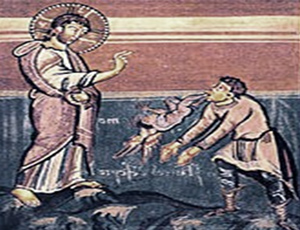
And immediately all the crowd, when they saw him, were greatly amazed, and ran up to him and greeted him. And he asked them, "What are you discussing with them?"
And one of the crowd answered him, "Teacher, I brought my son to you, for he has a dumb spirit; and wherever it seizes him, it dashes him down; and he foams and grinds his teeth and becomes rigid; and I asked your disciples to cast it out, and they were not able."
And he answered them, "O faithless generation, how long am I to be with you? How long am I to bear with you? Bring him to me."
And they brought the boy to him; and when the spirit saw him, immediately it convulsed the boy, and he fell on the ground and rolled about, foaming at the mouth.
And Jesus asked his father, "How long has he had this?" And he said, "From childhood. And it has often cast him into the fire and into the water, to destroy him; but if you can do anything, have pity on us and help us." And Jesus said to him, "If you can! All things are possible to him who believes." Immediately the father of the child cried out and said, "I believe; help my unbelief!"
And when Jesus saw that a crowd came running together, he rebuked the unclean spirit, saying to it, "You dumb and deaf spirit, I command you, come out of him, and never enter him again." And after crying out and convulsing him terribly, it came out, and the boy was like a corpse; so that most of them said, "He is dead."
But Jesus took him by the hand and lifted him up, and he arose.
And when he had entered the house, his disciples asked him privately, "Why could we not cast it out?" And he said to them, "This kind cannot be driven out by anything but prayer."
Mark 9.15-29
|
|
Because Matthew's Jesus "knows all things", the only questions he asks are rhetorical.
The man, kneeling, makes a single petition to Jesus, whom he addresses as Lord, not Teacher. There are no questions from Jesus answered by the man, the spirit does not cry out or convulse the boy in the presence of Jesus, and the silly idea of the "crowd running together" is omitted.
Rather than the boy appearing dead and needing to be lifted up, the healing is instant. Finally, rather than present "difficult cases" that respond only to prayer, Matthew has his Jesus say quite the opposite: with faith you can move mountains!
Gosh is Jesus actually exaggerating?!
And when they came to the crowd, a man came up to him and kneeling before him said, "Lord, have mercy on my son, for he is an epileptic and he suffers terribly; for often he falls into the fire, and often into the water. And I brought him to your disciples, and they could not heal him."
And Jesus answered, "O faithless and perverse generation, how long am I to be with you? How long am I to bear with you? Bring him here to me."
And Jesus rebuked him, and the demon came out of him, and the boy was cured instantly.
Then the disciples came to Jesus privately and said, "Why could we not cast it out?" He said to them, "Because of your little faith. For truly, I say to you, if you have faith as a grain of mustard seed, you will say to this mountain, 'Move from here to there,' and it will move; and nothing will be impossible to you."
Matthew 17.14-20
|
The Blind near Jericho
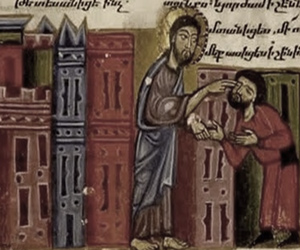
And as he was leaving Jericho with his disciples and a great multitude, Bartimaeus, a blind beggar, the son of Timaeus, was sitting by the roadside. And when he heard that it was Jesus of Nazareth, he began to cry out and say, "Jesus, Son of David, have mercy on me!"
And many rebuked him, telling him to be silent; but he cried out all the more, "Son of David, have mercy on me!" And Jesus stopped and said, "Call him." And they called the blind man, saying to him, "Take heart; rise, he is calling you." And throwing off his mantle he sprang up and came to Jesus.
And Jesus said to him, "What do you want me to do for you?" And the blind man said to him, "Master, let me receive my sight."
And Jesus said to him, "Go your way; your faith has made you well." And immediately he received his sight and followed him on the way.
Mark 10.46-52
|
|
Matthew drops the emphasized hybrid Greek/Hebrew name ("Bartimaeus, son of Timaeus) but boosts the miracle again by having two blind men, who address Jesus as Lord. Jesus himself calls them to him and they are cured not by his words about faith but by his touch.
And as they went out of Jericho, a great crowd followed him.
And behold, two blind men sitting by the roadside, when they heard that Jesus was passing by, cried out, "Have mercy on us, Son of David!"
The crowd rebuked them, telling them to be silent; but they cried out the more, "Lord, have mercy on us, Son of David!" And Jesus stopped and called them, saying, "What do you want me to do for you?" They said to him, "Lord, let our eyes be opened."
And Jesus in pity touched their eyes, and immediately they received their sight and followed him.
Matthew 20.29-34
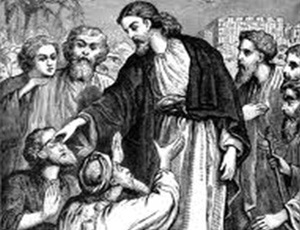
|
The Withered Fig Tree
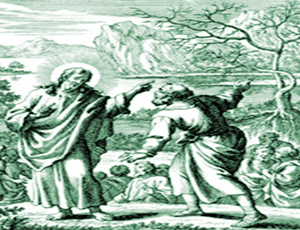
On the following day, when they came from Bethany, he was hungry. And seeing in the distance a fig tree in leaf, he went to see if he could find anything on it. When he came to it, he found nothing but leaves, for it was not the season for figs. And he said to it, "May no one ever eat fruit from you again." And his disciples heard it.
As they passed by in the morning, they saw the fig tree withered away to its roots. And Peter remembered and said to him, "Rabbi, look! The fig tree which you cursed has withered." And Jesus answered them, "Have faith in God. Truly, I say to you, whoever says to this mountain, 'Be taken up and cast into the sea,' and does not doubt in his heart, but believes that what he says will come to pass, it will be done for him.
Therefore I tell you, whatever you ask in prayer, believe that you have received it, and it will be yours. And whenever you stand praying, forgive, if you have anything against any one; so that your Father also who is in heaven may forgive you your trespasses."
Mark 11.12-14; 20-25
|
|
The fig tree that Mark had "in the distance" was moved by Matthew to a more respectful "side of the road" on which Jesus passed.
Jesus' lack of prior knowledge about the tree was minimized and the caveat that it was "not the season for figs" was dropped.
Rather than overnight, the hapless tree withered "at once" and this point was stressed by repetition. The incredulity expressed by Peter in Mark's version – that the curse of Jesus would have an effect ("Rabbi, look!") – was replaced by the amazement of all the disciples.
Matthew repeats the optimistic notion that with faith his followers will move mountains, repeating the gross nonsense used when he cured the boy with a demon. Because Jesus has become God, Matthew drops Mark's references to God and the Father.
In the morning, as he was returning to the city, he was hungry. And seeing a fig tree by the wayside he went to it, and found nothing on it but leaves only. And he said to it, "May no fruit ever come from you again!" And the fig tree withered at once. When the disciples saw it they marveled, saying, "How did the fig tree wither at once?"
And Jesus answered them, "Truly, I say to you, if you have faith and never doubt, you will not only do what has been done to the fig tree, but even if you say to this mountain, 'Be taken up and cast into the sea,' it will be done. And whatever you ask in prayer, you will receive, if you have faith."
Matthew 21.18-22
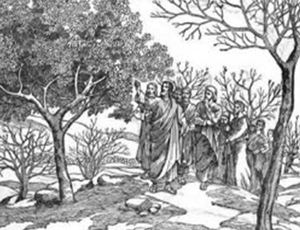
|
At Capernaum
All but one of the eighteen miracles found in Mark was regurgitated in Matthew. The exception was the first of Mark's miracles, the man with an unclean spirit in the synagogue at Capernaum.
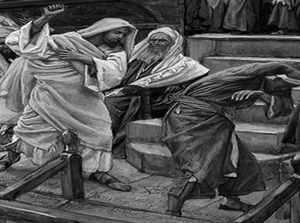
And immediately there was in their synagogue a man with an unclean spirit; and he cried out, "What have you to do with us, Jesus of Nazareth? Have you come to destroy us? I know who you are, the Holy One of God." But Jesus rebuked him, saying, "Be silent, and come out of him!" And the unclean spirit, convulsing him and crying with a loud voice, came out of him.
Mark 1.23-26
|
|
Matthew's subservient Centurion
The unlikely scenario of a "demon-possessed man" still attending synagogue – sacrilege to pious Jews – was dropped by Matthew. In its stead, Matthew introduced, at Capernaum, something rather more to his sectarian taste – a subservient Roman officer!
In a reflection of the fierce sectarian politics at the time the author was writing, Matthew features a centurion who completely abases himself before the Jewish Jesus. The Roman (like the unclean spirit in Mark) knows who Jesus is and deems himself "not worthy."
The magnanimous Jesus accepts him "into the kingdom" whilst at the same time warning other Jews they "will be thrown into outer darkness." The remote healing, of course, is instantaneous. Again, the story is indicative of fierce sectarianism within Judaism.
As he entered Capernaum, a centurion came forward to him, beseeching him and saying, "Lord, my servant is lying paralyzed at home, in terrible distress." And he said to him, "I will come and heal him."
But the centurion answered him, "Lord, I am not worthy to have you come under my roof; but only say the word, and my servant will be healed. For I am a man under authority, with soldiers under me; and I say to one, 'Go,' and he goes, and to another, 'Come,' and he comes, and to my slave, 'Do this,' and he does it."
When Jesus heard him, he marveled, and said to those who followed him, "Truly, I say to you, not even in Israel have I found such faith. I tell you, many will come from east and west and sit at table with Abraham, Isaac, and Jacob in the kingdom of heaven, while the sons of the kingdom will be thrown into the outer darkness; there men will weep and gnash their teeth."
And to the centurion Jesus said, "Go; be it done for you as you have believed." And the servant was healed at that very moment.
Matthew 8.5-13
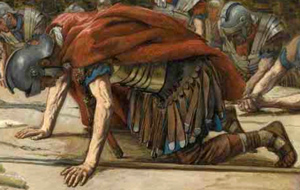 Rome humbled! Rome humbled!
|
Jesus, Taxes and a fishy story
Pay tax
The Pharisees were critical of Jesus carousing with tax collectors but Mark's Jesus was committed to paying Roman taxes:
And as he sat at table in his house, many tax collectors and sinners were sitting with Jesus and his disciples; for there were many who followed him. And the scribes and the Pharisees, when they saw that he was eating with sinners and tax collectors, said to his disciples, "Why does he eat with tax collectors and sinners?"
Mark 2.15-16.
And they sent to him some of the Pharisees and some of the Herodians, to entrap him in his talk. And they came and said to him, "Teacher, we know that you are true, and care for no man; for you do not regard the position of men, but truly teach the way of God. Is it lawful to pay taxes to Caesar, or not? Should we pay them, or should we not?" But knowing their hypocrisy, he said to them, "Why put me to the test? Bring me a coin, and let me look at it." And they brought one. And he said to them, "Whose likeness and inscription is this?" They said to him, "Caesar's." Jesus said to them, "Render to Caesar the things that are Caesar's, and to God the things that are God's." And they were amazed at him.
Mark 12.13-18.
|
|
Pay tax but only not "to give offence" !
Matthew's Jesus agrees to paying taxes but in this bizarre miracle of a fish caught with a shekel in its mouth, he makes it clear that, as the son of God, he is exempt from paying "God's tax". As a concession he agrees to pay his own tax bill but only not "to give offence."
What a waste of omnipotence!
When they came to Capernaum, the collectors of the half-shekel tax went up to Peter and said, "Does not your teacher pay the tax?" He said, "Yes."
And when he came home, Jesus spoke to him first, saying, "What do you think, Simon? From whom do kings of the earth take toll or tribute? From their sons or from others?" And when he said, "From others," Jesus said to him, "Then the sons are free. However, not to give offense to them, go to the sea and cast a hook, and take the first fish that comes up, and when you open its mouth you will find a shekel; take that and give it to them for me and for yourself."
Matthew 17.24-27
A fish with a coin in its mouth. Really! What a waste of omnipotence!
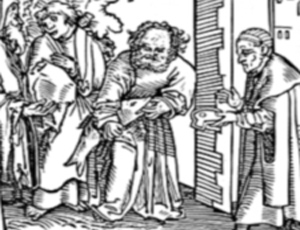
|
Failure in Nazareth?
Can't work
And Jesus said to them, "A prophet is not without honor, except in his own country, and among his own kin, and in his own house." And he could do no mighty work there, except that he laid his hands upon a few sick people and healed them. And he marveled because of their unbelief.
Mark 6:4-6 |
|
Won't work!
Mark described a situation wholly unacceptable to Matthew – a Jesus whose power was limited by others, leaving him marvelling at their unbelief. Matthew preserved the omnipotence of his Jesus by switching "could not" to "did not". Now it was because of their unbelief that he chose not to do "many" mighty works. He also dropped the compromising reference to "his own kin." Hell, this guy's a God!
And they took offense at him. But Jesus said to them, "A prophet is not without honor except in his own country and in his own house." And he did not do many mighty works there, because of their unbelief.
Matthew 13.57-58
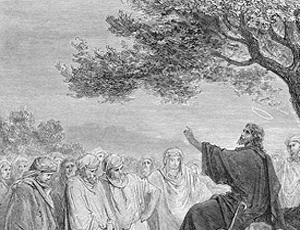
|
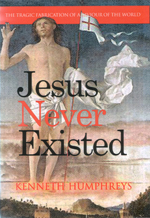
|
 |

|

|
Some fifty articles are now available as a book.
For your copy order:

|
|
Copyright © 2004
by Kenneth Humphreys.
Copying is freely permitted, provided credit is given to the author and
no material herein is sold for profit.
|

